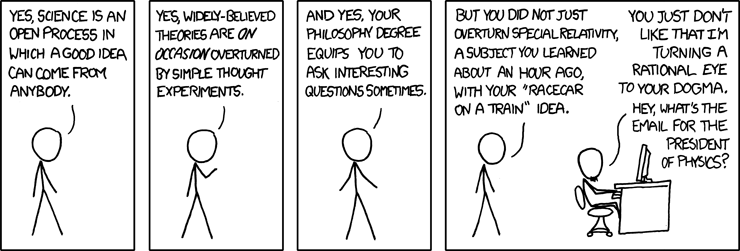The question of origins is one of those elephants in the Christian room – it causes fights. I’ve started treating it as a taboo topic – it only ever causes division. But it’s a question that is increasingly an important one to have thought through when it comes to apologetics and evangelism.
Sometimes Christians can be a bit like the guy in this XKCD cartoon when it comes to widely held and established scientific belief.

Scientific questions can be hard – but ultimately our faith is not predicated on rejecting the scientific method and human knowledge of the world – but on accepting the resurrection of Jesus and God’s revelation of his grand plan to tackle the problem of sin and death in a new creation.
The issue of science can be polarising. I shared this article in Google Reader the other day (also – please note – I don’t always endorse the content of articles I share, I simply share articles when I find them interesting) and prompted an interesting discussion with some Christian siblings on google buzz.
Here are some interesting articles I have been reading and pondering on the issue in recent times. Including a few from BioLogos – an organisation set up by Francis Collins to highlight the compatibility of Christian faith and faith in scientific discoveries (I’ll post the blurb about the organisation after the links).
- Michael Jensen advocating a less tolerant approach to the issue.
- A follow up to the “why I’m no longer a (young earth) creationist” linked above entitled “Why I’m neither a creationist or an evolutionist”
- A “scholarly” article from BioLogos on Theistic Evolution (PDF).
- An article from Tim Keller on how to handle the issue pastorally.
- An article linking the currently accepted “fundamentalist” position on Genesis 1 to the “Fundamentalist” movement of the early 20th century and the failed Seventh Day Adventist prophetess Ellen White.
- Here’s a quote from Augustine that shows what the oft-venerated church father thought of reading Genesis as science
- Evangelical Christian and quantum physics genius Ross McKenzie recently shared the slides from a sermon he preached on Genesis 2.
You may have noticed that most of these resources support a non “young earth” position – I am sympathetic to those who want to put a high value on scripture, and I think we should recognise the science is a fallible human construct. If you’re going to read any of those articles read Keller’s it is by far the most useful.
But I think we also need to consider that the author of Genesis did not intend his work (and depending on your view of scripture – neither did God) to be read as science but as theology. The question then is what does this teach us about God and his redemptive plan first and foremost.
And I want to stress that I don’t think your personal views on Genesis are salvific – and it is possible to lose your faith in a young earth without losing your faith in the atoning work of Jesus on the cross – if we make this issue the yardstick of orthodoxy or fellowship we run the risk of being gravely wrong when we get to heaven and find out the truth.
About BioLogos
On one end of the spectrum, “new atheists” argue that science removes the need for God. On the other end, religious fundamentalists argue that the Bible requires us to reject many of the conclusions of modern science. Many people — including scientists and believers in God — do not find these extreme options attractive.BioLogos represents the harmony of science and faith. It addresses the central themes of science and religion and emphasizes the compatibility of Christian faith with scientific discoveries about the origins of the universe and life.
